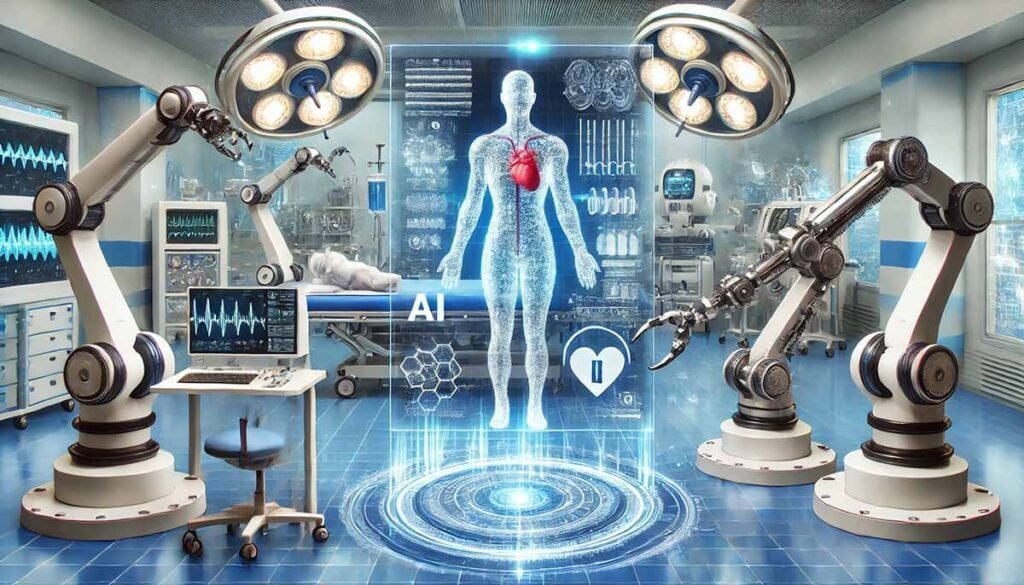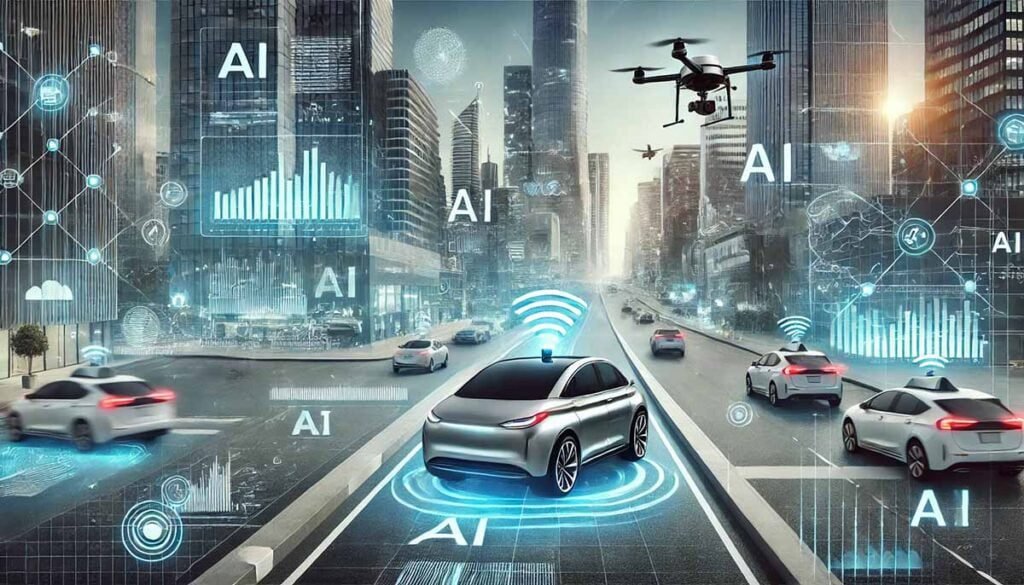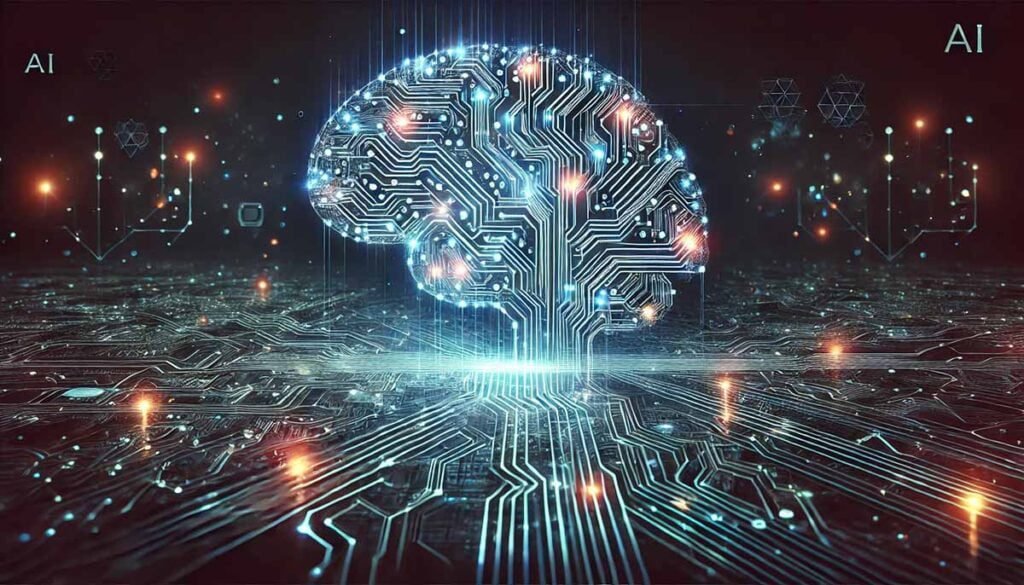Artificial Intelligence, or AI, is more than just a buzzword—it is a game-changer in today’s world. AI is everywhere, from your smartphone’s voice assistant to the recommendation engines on your favorite streaming service. It is woven into the fabric of modern life, shaping how we interact with technology, make decisions, and even how businesses operate. But what exactly is Artificial Intelligence? And why should you care?
At its core, AI is about machines doing tasks that usually need human smarts—things like understanding speech, recognizing images, or making decisions. Think of AI as the brains behind the tools we use daily, quietly working to make our lives easier and more efficient.
But AI is not just one thing. It is an umbrella term covering a range of technologies, from basic algorithms to complex systems that learn and adapt over time. Whether it’s helping doctors diagnose diseases or powering self-driving cars, AI is revolutionizing industries across the globe.
In this article, we will dive into the world of Artificial Intelligence, breaking down what it is, how it is used, and the different types you should know about. Whether you are a tech enthusiast or just curious, understanding AI is crucial in navigating our increasingly digital world.
What Is Artificial Intelligence?
Definition of Artificial Intelligence
Artificial Intelligence, or AI, is the science of creating machines that can perform tasks typically requiring human intelligence. These tasks include recognizing patterns, understanding natural language, solving problems, and making decisions. AI is about building systems that can “think” in some way, whether by processing massive amounts of data or learning from their experiences. In simple terms, AI enables computers to mimic human abilities.
Brief History of AI
AI is not new. It is rooted in the mid-20th century when scientists like Alan Turing asked whether machines could think. The term “Artificial Intelligence” was coined in 1956 at a conference at Dartmouth College. Since then, AI has seen progress and setbacks, from early rule-based systems to today’s machine learning and deep learning models. What started as a theoretical concept has become a driving force behind many technologies we use daily.
Discover the captivating journey of AI, from ancient myths to groundbreaking innovations! Dive into “History and Evolution of AI” to explore how artificial intelligence has shaped our world and what the future holds.
Core Technologies in AI
AI is a broad field, but at its core are a few key technologies:
- Machine Learning: Where computers learn from data without being explicitly programmed.
- Deep Learning: A subset of machine learning using neural networks to analyze complex patterns in large datasets.
- Natural Language Processing (NLP): The ability of a machine to understand and generate human language.
- Computer Vision: Enabling machines to interpret and make decisions based on visual information.
These technologies form the backbone of AI, powering everything from chatbots to autonomous vehicles. Understanding these core technologies is essential to grasp how AI works and its potential impact on our lives.
Curious about how AI is transforming industries and driving innovation? Dive into our article, “Core Technologies in AI: Discover the Future of Innovation!” Discover the powerful technologies behind AI and see what the future holds! Don’t miss out on understanding the next big wave in tech!
The Types of Artificial Intelligence
Artificial Intelligence (AI) is not just one thing—it is a spectrum of technologies with varying levels of sophistication. Understanding these different types of AI helps us grasp how far we have come and where we are headed. Below are the key types of AI, ranging from the simplest forms to the most complex and theoretical.
Reactive Machines
Reactive machines represent the most fundamental type of AI. These systems are designed to respond to specific inputs with predefined actions. They do not store past experiences and cannot learn or improve over time. A classic example is IBM’s Deep Blue, the chess-playing computer that defeated world champion Garry Kasparov in 1997. Deep Blue could evaluate millions of chess moves but did not remember past games. It simply reacted to the current game state based on its programming. While reactive machines can be incredibly powerful in narrow applications, they are limited by their lack of adaptability.
Limited Memory AI
Limited memory AI takes things further by incorporating memory into its decision-making process. Unlike reactive machines, these systems can use past experiences to inform current actions. For instance, self-driving cars use limited memory AI to make real-time decisions on the road. They remember the speed of nearby vehicles, the location of obstacles, and other factors to navigate safely. However, this memory is short-term, and the AI does not store experiences for future use beyond the immediate task.
Theory of Mind AI
Theory of Mind AI is still largely theoretical but represents a significant leap forward. This type of AI aims to understand and simulate human emotions, beliefs, and intentions. Essentially, it seeks to grasp the “mind” behind the actions. If developed, Theory of Mind AI could revolutionize areas like social robotics and human-computer interaction, making machines that can interact with us on a much deeper, more personal level. However, creating machines with this capability remains a significant challenge and is far from becoming a reality.
Self-Aware AI
At the pinnacle of AI development is Self-Aware AI, a concept primarily found in science fiction. This type of AI would understand human emotions and thoughts and possess self-awareness—knowing its own existence and purpose. While it sounds intriguing, Self-Aware AI is purely speculative at this stage. Its development would raise profound ethical and philosophical questions, as these machines would have consciousness like humans. It is the stuff of movies but not something we are likely to see in the near future.
These types of AI illustrate the varying degrees of complexity within the field, from simple, rule-based systems to potential future technologies that could transform our understanding of intelligence.
Curious about the future of AI? Dive into “Types of AI: Discover the Future of Artificial Intelligence Now!” and explore how AI is reshaping industries and everyday life. Don’t miss out on the latest insights!
Uses of Artificial Intelligence in Various Industries
Artificial Intelligence (AI) has entered virtually every industry, driving innovation and transforming how businesses operate. Below, we will explore how AI is used across different sectors, highlighting its versatility and impact.
Healthcare

AI is transforming healthcare, bringing intelligence and efficiency to the field. In diagnostics, AI-powered tools analyze medical images, like X-rays and MRIs, to detect diseases at an early stage. For instance, AI can identify cancer or heart disease signs faster than human doctors, improving patient outcomes. Moreover, AI helps in personalized treatment plans. By analyzing a patient’s genetic makeup and medical history, AI algorithms suggest tailored therapies that are more likely to be effective. AI is also at the forefront of drug discovery, where it accelerates the process of finding new medications by analyzing vast datasets of chemical compounds.
Finance
Another sector where AI is progressing significantly is finance. AI-driven algorithms are the backbone of algorithmic trading, where they analyze market trends and execute trades at lightning speed, maximizing profits while minimizing risks. Fraud detection is another critical use of AI in finance. By monitoring transactions and identifying unusual patterns, AI systems can detect and prevent fraudulent activities before they cause significant damage. AI also enhances risk management, which helps financial institutions predict market trends and make informed decisions.
Transportation

AI is making autonomous vehicles possible in the transportation sector. Companies like Tesla and Google are using AI to power self-driving cars, which rely on machine learning and computer vision to navigate roads safely. AI also plays a vital role in optimizing logistics and supply chain management. It helps companies reduce delivery times and costs by predicting traffic patterns and optimizing routes. Additionally, AI-powered drones are used for everything from delivering packages to monitoring traffic conditions.
Education
AI is revolutionizing education by offering tailored educational opportunities. AI-powered tutoring systems adapt to each student’s learning style and pace, offering customized lessons that improve comprehension and retention. For example, platforms like Khan Academy use AI to assess a student’s performance and suggest tailored exercises to address weaknesses. Teachers can concentrate on teaching because AI is also utilized for administrative duties like scheduling and grading.
Retail
AI improves operational effectiveness and customer experience in the retail industry. AI-powered recommendation engines analyze customer behavior and preferences to suggest products they will likely buy. This personalization increases customer satisfaction and sales. Retailers also use AI for inventory management, predicting which products will be in demand and ensuring they are always in stock. Moreover, AI chatbots provide real-time customer support, answering queries and resolving issues without human intervention.
These examples illustrate just a few ways AI is transforming industries. As AI technology evolves, its applications will only expand, driving further innovation and efficiency across sectors.
Ethical Considerations and Challenges of Artificial Intelligence
As Artificial Intelligence (AI) becomes increasingly integrated into our daily lives, the ethical considerations and challenges surrounding its use have come to the forefront. While AI offers immense benefits, it also raises concerns that need careful attention.
Bias in AI
Bias in AI algorithms is among the most urgent ethical concerns. AI systems learn from data, and if that data is biased, the AI will likely produce biased outcomes. For example, facial recognition systems have been criticized for higher error rates when identifying people of color, leading to concerns about discrimination and fairness. Addressing this requires:
- Diverse Data Sets: Ensuring that AI is trained on diverse and representative data.
- Transparency: Making AI decision-making processes more transparent to identify and correct biases.
Privacy Concerns
AI’s ability to process and analyze vast amounts of data raises privacy concerns. AI systems often require access to personal information to function effectively, but this can lead to potential misuse of data. For instance, AI-driven surveillance systems can infringe on individual privacy rights, leading to a society where citizens are constantly monitored. To mitigate these risks:
- Data Protection: Implementing strong data encryption and anonymization techniques.
- Regulations: Enforcing stringent regulations to ensure that personal data is handled responsibly.
Job Displacement
AI’s efficiency in automating tasks poses a challenge to the job market. As AI continues to replace human labor in various sectors, concerns about job displacement are growing. Many fear that widespread automation could lead to unemployment and economic inequality. To address this:
- Retraining Programs: Developing initiatives to reskill workers for new roles in the AI-driven economy.
- Economic Policies: Implementing policies that support workers affected by automation, such as unemployment benefits and job creation programs.
While AI holds the potential to transform society for the better, these ethical considerations and challenges must be carefully managed to ensure that its benefits are realized without compromising human rights or societal values.
The Future of Artificial Intelligence
The future of Artificial Intelligence (AI) is a topic filled with both excitement and uncertainty. As AI advances, it promises to reshape the world in ways we are only beginning to understand.
Predictions for AI
Experts predict that AI will become even more integrated into our daily lives, making tasks more efficient and personalized. From smarter homes to more responsive healthcare, AI could revolutionize our lives and work. Potential developments include:
- Artificial General Intelligence (AGI): The development of AI that can perform any intellectual task a human can do is still a long-term goal. If achieved, AGI could lead to unprecedented innovations.
- AI in Creative Fields: AI is already dabbling in art, music, and writing. In the future, we might see AI co-creating with humans, pushing the boundaries of creativity.
Potential Benefits
AI holds immense potential to solve complex global challenges. For example:
- Healthcare: AI could enable personalized medicine, predicting diseases before they occur and tailoring treatments to individual genetic profiles.
- Sustainability: AI can optimize energy use and reduce waste, helping to address environmental issues like climate change.
Potential Risks
However, the future of AI is not without risks. As AI systems become more powerful, concerns about their control and the ethical implications of their decisions grow. These include:
- Autonomy: As AI systems gain more independence, ensuring they align with human values becomes crucial.
- Existential Risks: The hypothetical development of superintelligent AI poses questions about humanity’s long-term survival.
Although the future of AI seems bright, there are obstacles to overcome. As we move forward, it will be essential to balance innovation with responsibility, ensuring that AI’s evolution benefits all of humanity.
Conclusion
Artificial Intelligence is no longer a futuristic concept—it is a reality already shaping our world. From enhancing everyday tasks to transforming entire industries, AI’s impact is undeniable. We have explored what AI is, its different types, and its vast applications across various sectors. But with this power comes responsibility.
As AI continues to evolve, so must our understanding of its ethical implications. Addressing issues like bias, privacy, and job displacement is crucial to ensure AI benefits everyone. The future of AI is full of potential, offering both incredible opportunities and significant challenges.
In the end, AI is a tool that, if used wisely, can drive innovation and improve lives. As we navigate this rapidly changing landscape, staying informed and considering the broader implications will help us harness AI’s full potential while safeguarding our values.
FAQ Section
1. What is Artificial Intelligence (AI) in simple terms?
The technology known as artificial intelligence, or AI, allows machines to carry out tasks that would typically require human intelligence. These include interpreting language, spotting patterns, coming to conclusions, and learning from mistakes. In simple terms, AI allows computers to “think” and solve problems in ways that mimic human capabilities.
2. What categories of artificial intelligence are there primarily?
AI can be categorized into several types:
- Reactive Machines: Basic AI that reacts to specific inputs without memory or learning capabilities.
- Limited Memory: AI that can use past experiences to make decisions in real time.
- Theory of Mind: A more advanced, still theoretical, form of AI that understands human emotions and intentions.
- Self-Aware AI: A speculative concept where AI possesses self-awareness, similar to human consciousness.
3. How is AI used in everyday life?
AI is deeply integrated into our daily routines, often in ways we do not even notice. Examples include:
- Virtual Assistants like Siri or Alexa answer voice commands.
- Recommendation Engines on platforms like Netflix or Amazon suggesting content or products based on your preferences.
- Autonomous Vehicles that use AI to steer roads and avoid obstructions.
- Health Apps that monitor fitness levels and suggest personalized workout routines.
4. What are the ethical concerns related to AI?
AI raises several ethical concerns, including:
- Bias: AI can perpetuate existing societal biases if trained on biased data.
- Privacy: AI systems often require access to personal data, raising concerns about how this information is used and protected.
- Job Displacement: As AI automates more tasks, job loss is risky in certain industries, leading to economic inequality.
5. How will AI develop in the future?
AI has a bright future, but it is also unclear. We expect AI to become even more integrated into our lives, driving advancements in healthcare, sustainability, and more. However, there are also significant challenges, such as ensuring AI systems align with human values and managing the risks of autonomous AI. The development of Artificial General Intelligence (AGI) and Artificial Super intelligence (ASI) remains a long-term goal, but these advancements also pose profound ethical and existential questions.
If you found our content helpful don’t forget to share it on your social media: Twitter.
For more insightful articles, please visit BloghubHQ.

